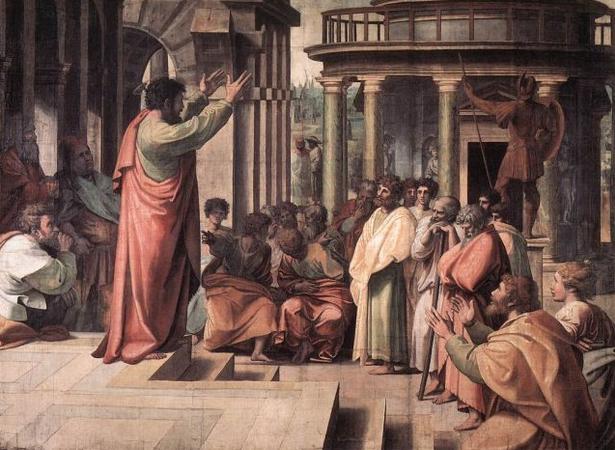View
A New Pope for Gideon
Kevin Raedy on Captain Kirk, Contraception & Christian Tradition
I am not a Trekkie. I do not own a set of Vulcan costume ears, I cannot speak a word of Klingon, and I've never endured a book-signing queue in pursuit of an autograph from William Shatner.
I will confess, however, that, for me, the original Star Trek program that aired in the late 1960s still holds its allure, and some time ago I found myself locked in, as if by tractor beam, to an episode that I'd seen before.
To be honest, I've seen them all—most of them more than once. But those viewings took place before I became theologically aware. As this particular rerun unfolded, I was surprised—and somewhat amused—to find myself witnessing what appears to have been Hollywood's real-time response to Pope Paul VI's 1968 encyclical, Humanae Vitae.
Not surprisingly—it was, after all, the late sixties—the tone and content of the commentary offered by Starfleet's band of galaxy-hopping explorers is quite dim. Today, nearly fifty years since the original airing of that episode, contraception has become an unquestioned norm. Access is treated as an entitlement, and those who oppose the current state of affairs find themselves an easy target for ridicule.
The more salient and more disconcerting phenomenon, however, is that the vast majority of Christians, including Catholics, have, over that same fifty years, allowed themselves to be assimilated into society at large on the issue of contraception. It's well past time for Christians of all stripes to ponder more carefully the origins and consequences of what has become a de facto Christian sanctioning of contraception, and to consider whether an end to that detour is in order. The contours of the path that leads out of the morass may not be self-evident, but the journey forward begins with a look backwards, into our past.
The Tale of the Gideonites
The Star Trek episode is called "The Mark of Gideon." It is the story of a germ-free planet—Gideon—that was once a paradise where inhabitants thrived in corporeal and spiritual perfection. Over time, however, the absence of disease conspired with the Gideonites' deeply ingrained respect for life—one that precluded contraception, sterilization, and abortion—to produce a case of suffocating overpopulation.
Captain Kirk, the viewer learns, has been pegged by the Gideonite leadership as the unwitting solution to their problem (he is the "mark" of Gideon). Although cured of a potentially lethal illness he once contracted, his blood carries vestiges of the disease—microorganisms that can be extracted and introduced into selected individuals as a means of reducing the population and restoring the planet to the paradisiacal flourishing that its inhabitants once enjoyed.
To execute their stratagem, the Gideonites trick Kirk into beaming down to the transporter room of an exact, full-scale replica of the interior of the starship Enterprise, leaving him under the impression that he remains on his own ship while the entirety of his crew has disappeared. As he weaves his way through the corridors of the empty "ship," searching for clues and attempting to unravel the conundrum in which he finds himself, Kirk stumbles into his obligatory encounter with this episode's attractive, scantily clad, female guest character.
Odona, a Gideonite, has, in martyr-like fashion, voluntarily submitted to contraction of the disease Kirk carries as part of a larger plan in which her sacrificial action will inspire others to do the same. She is dispatched into the cloned ship to dramatize to Kirk the desperation of their situation so that, once wise to the deception, he may nonetheless acquiesce to their plans and choose to remain on the planet as a ready source of the sickness that will allow Gideon to reduce its population.
When Odona begins showing symptoms of the illness (the Gideonites' scheme provided for the surreptitious extraction of a sample of Kirk's blood), Hodin, Gideon's ambassador and Odona's father, enters the replica and reveals to Kirk the ruse to which he has been subject. An angry exchange follows in which Hodin explains that the simultaneous increases in lifespan and live births have left the planet so heavily populated that the people of Gideon "can find no rest, no peace, no joy."
After learning that, for biological reasons, sterilization is not a viable option for the Gideonites, Kirk implores (William Shatner sets his overacting on "stun" for this scene) Hodin to "let your people learn about the devices to safely prevent conception. The Federation," he submits, "will provide anything you need."
"But you see," says Hodin, "the people of Gideon have always believed that life is sacred—that the love of life is the greatest gift. That is the one unshakable truth of Gideon. And this overwhelming love of life has developed our regenerative capacity and our great longevity."
"And the great misery which you now face!"
"That is bitterly true, Captain. Nevertheless, we cannot deny the truth which has shaped our evolution. We are incapable of destroying or interfering with the creation of that which we love so deeply—life, in every form, from fetus to developed being. It is against our tradition, against our very nature. We simply could not do it."
"Yet," Captain Kirk replies bitterly, "you can kill a young girl!"
The Intended Lesson for Viewers
This heated dialogue encapsulates the lesson that this episode holds for its viewers: to act on the belief that life is sacred—to the point of proscribing contraception, along with sterilization and abortion—will ultimately result in individual and collective misery. "No stranger could realize," says Ambassador Hodin to Kirk, "the horror that life can be here." That misery leads to a desperation so great that, for the Gideonites, there is no choice but to pursue a solution—a program of mass suicide—that violently militates against their one
unshakable truth.
Kirk, ever the voice of reason, points out the contradiction in no time flat. In response to Kirk's charge, Hodin replies that he is not killing his daughter—she has freely chosen this course of action, just as all the people of Gideon "are free to choose."
Poor Ambassador Hodin. He is so blinded and confused by his culture's uncompromising and unthinking commitment to life that he cannot see that the Gideonites' unwavering repudiation of contraception (and abortion!) has, in fact, robbed them of their freedom and undercut their one unshakeable truth. They are not free to choose contraception, and thus the only escape from their dilemma is to enact a wide-scale termination of the very life they hold so sacred.
Hodin, with his doctrinaire rejection of contraception and abortion, is, of course, intended as a portrayal of the Catholic Church (his use of the words "tradition" and "nature" can hardly be mere happenstance). On the surface, it might appear that the show's argument is simply a practical claim regarding the impending dangers of overpopulation, faithful to the Malthusian Zeitgeist of the 1960s. But there is a disdain that runs much deeper.
As a caricature of the church, Hodin is unwittingly captive to his own stubborn embrace of an outmoded belief system, one that will ultimately—and self-evidently, to those with eyes to see—lead to dire consequences for the very life that he professes to hold sacred. Further, he is portrayed throughout the episode as a duplicitous liar engaged in the orchestration of an elaborate deception. With this episode, the writers of Star Trek surely hoped that they could help the Catholic Church not only to see the grave error of its stance on life, but also to see itself more clearly.
Of course, neither Humanae Vitae nor any analogous, fictional text enters into the plot of the episode, but the timeline of events leaves little room for coincidence. Pope Paul VI put his signature on the encyclical on July 25, 1968. The preliminary formulation of the episode was completed approximately one month earlier (the ability of a simple internet search to unearth obscurities such as this will never cease to amaze me), by which time the church's internal deliberations over the issue of contraception had become quite public. The script was finalized in mid-October, roughly two and a half months after Humane Vitae was formally promulgated, and the episode aired on January 17, 1969.
The Prescience of Humanae Vitae
Non-Catholic viewers (and, sadly, many self-identifying Catholic ones) may have found nothing objectionable in the episode, believing that the pope doesn't speak for them or to them, at least not on the matter of contraception. Perhaps so. But it's worth noting that the stance on contraception set forth in Humanae Vitae is not just Roman Catholic teaching. Rather, it is a reaffirmation of what, until 1930, was uniformly Christian teaching. Thus, a fair-minded person, regardless of ecclesial allegiance, might do well to ponder the arguments of Humanae Vitae, even if he or she doesn't care for its conclusion that contraception must be rejected.
One such argument entails a consideration of the consequences likely to arise in the wake of widespread contraceptive use. Humanae Vitae stipulates four: (1) an increase in marital infidelity; (2) a broad decline in standards of morality; (3) the reduction of women to mere instruments of satisfaction; and (4) the imposition of contraceptives on the general populace by governmental authorities. One need be neither a Roman Catholic nor a credentialed sociologist to observe that these predictions have largely come to fruition (for a detailed discussion, see Mary Eberstadt, "The Vindication of Humanae Vitae" in First Things, August/September 2008, pp. 35–42).
Bearing in mind that Humanae Vitae was promulgated in 1968, even skeptical readers of that text would today have to acknowledge its prescience. And given that the television episode in question aired at a relatively early stage of our experience with the widespread practice of contraception (the pill was not legally available to unmarried women in all fifty states until 1972), perhaps the blithe, mocking tone of Star Trek's commentary might be excused.
Fifty years later, however, as we're confronting some of the more pernicious manifestations of the culture that widespread contraception has helped to create—no-fault divorce, a thriving abortion industry, and a mandate issued by the federal government that seeks to make all of us complicit in the distribution of contraceptives—the obliviousness is a bit more perplexing. It's all the more perplexing given that Christians are contracepting at nearly the same rate as everyone else: one expects those who walk in the light to have greater clarity of vision.
It's unlikely that any precise claims can be made regarding the extent to which Christians are culpable for the pervasiveness of the contraceptive behavior that we now observe. Consider, however, that it took less than forty years to get from the Lambeth Conference of 1930—the first crack in the (Christian) foundation—to the point where a primetime network television program could lampoon the historically Christian view of contraception with apparently no fear of rankling its viewership.
Stated another way (and under the tame assumption that much of the show's viewing audience would have self-identified as Christian), it took forty years for Christians to be lulled into a state of indifference, or even rebellion, over what had been a moral certainty for the entire history of Christianity. Finger-pointing aside, given that we are talking about a matter that bears heavily on the possibility of sustaining (reviving?) a culture of life—of alleviating the anomie anticipated by Humanae Vitae—I think it very likely that Christians will have to take the lead in navigating a path out of the detritus that is now strewn about us.
The Path of Humility
It takes a prodigious act of hubris to thumb one's nose at 2,000 years of accumulated wisdom. I suspect it will take a similarly prodigious act of humility before we are able to glimpse the path that leads out of the dark wood in which we find ourselves. What might such humility look like?
It could begin with deference to what G. K. Chesterton called "the democracy of the dead," a humble regard for the faith handed down to us by those Christians who have gone before us, for it is on their shoulders that we stand. For Catholics, that means a renewed and proper respect for Sacred Tradition. For Protestants, it might entail a renewed and sympathetic attentiveness to figures such as Luther, Calvin, and Wesley, all of whom repudiated in no uncertain terms the moral permissibility of contraception. In any case, it means engaging—with a mindset that leaves us open to fraternal correction—those from whom we have inherited the faith we live today.
A heart that is steeped in humility is one that is also open to repentance. Not simply sorrow—although that's a very good place to begin—but a turning about, a rejection of what the world has embraced. When it comes to the glamorous but empty promises of contraception, it's time for Christians to start listening to the wisdom that is "justified by all her children" (Luke 7:35), and not to Captain Kirk. •
Kevin Raedy holds MTS and ThM degrees and writes from Hillsborough, North Carolina, where he lives with his wife and two children. He has published in the journal Nova et Vetera and at Aleteia.org.
subscription options
Order
Print/Online Subscription

Get six issues (one year) of Touchstone PLUS full online access including pdf downloads for only $39.95. That's only $3.34 per month!
Order
Online Only
Subscription

Get a one-year full-access subscription to the Touchstone online archives for only $19.95. That's only $1.66 per month!
bulk subscriptions
Order Touchstone subscriptions in bulk and save $10 per sub! Each subscription includes 6 issues of Touchstone plus full online access to touchstonemag.com—including archives, videos, and pdf downloads of recent issues for only $29.95 each! Great for churches or study groups.
Transactions will be processed on a secure server.
more on culture from the online archives

33.1—January/February 2020
Do You Know Your Child’s Doctor?
The Politicization of Pediatrics in America by Alexander F. C. Webster
more from the online archives
calling all readers
Please Donate
"There are magazines worth reading but few worth saving . . . Touchstone is just such a magazine."
—Alice von Hildebrand
"Here we do not concede one square millimeter of territory to falsehood, folly, contemporary sentimentality, or fashion. We speak the truth, and let God be our judge. . . . Touchstone is the one committedly Christian conservative journal."
—Anthony Esolen, Touchstone senior editor












